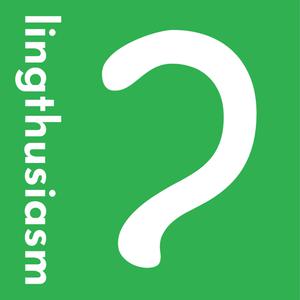99: A politeness episode, if you please
If it wouldn't be too much trouble, if you have a spare half hour, could we possibly suggest that you might enjoy listening to this episode on politeness? Or, if you'd prefer a less polite version, "Listen! Now!"
In this episode, your hosts Gretchen McCulloch and Lauren Gawne get enthusiastic about what politeness and rudeness are made up of at a linguistic level. We talk about existing cultural notions of "saving face" and "losing face", aka the push and pull between our desire for help vs our desire for independence, and how they've been formalized in a classic linguistics paper. We also talk about being less polite to show intimacy, addressing God in English and French, which forms of politeness are and aren't overtly taught, different uses of "please" in UK vs US English, levels of indirectness, email etiquette across generations and subcultures, rudeness and pointing, nodding norms in Japanese and English, smiling at strangers in the US vs Europe, and how a small number of politeness ingredients can combine in so many different ways that are culturally different.
Click here for a link to this episode in your podcast player of choice: episodes.fm/1186056137/episode/dGFnOnNvdW5kY2xvdWQsMjAxMDp0cmFja3MvMTk5MDMyNTM3MQ
Read the transcript here: lingthusiasm.com/post/770341829256364032/transcript-episode-99
Announcements:
In this month’s bonus episode we get enthusiastic about science metaphors and learning everything with Tom Lum and Caroline Roper, cohosts of Let's Learn Everything! We talk about whether programming languages should count as a language credit, numbers and ritual stock phrases like seventeen and "once upon a time", as well as etymology and metaphor in ecology, chemistry, and linguistics. We also talk about turning the "constantly trying to figure things out" part of your brain off, attending the word of the year vote, and how linguists have a tendency to be curious about language all the time, which... sometimes gets us into trouble.
Join us on Patreon now to get access to this and 90+ other bonus episodes, plus access to the Lingthusiasm Discord server where you can chat with other language nerds. Find it all right here: patreon.com/lingthusiasm
Looking for a last minute gift for the language nerd in your life? Or are you trying to get someone in your life to love linguistics as much as you do? Patreon have newly added a gift memberships feature! So if you'd be excited to receive a patreon membership to Lingthusiasm, forward this link to your friends and/or family with a little wink wink nudge nudge patreon.com/lingthusiasm/gift
For links to things mentioned in this episode: lingthusiasm.com/post/770341545981444096/lingthusiasm-episode-99-a-politeness-episode-if
20 December 2024, 12:00 am
